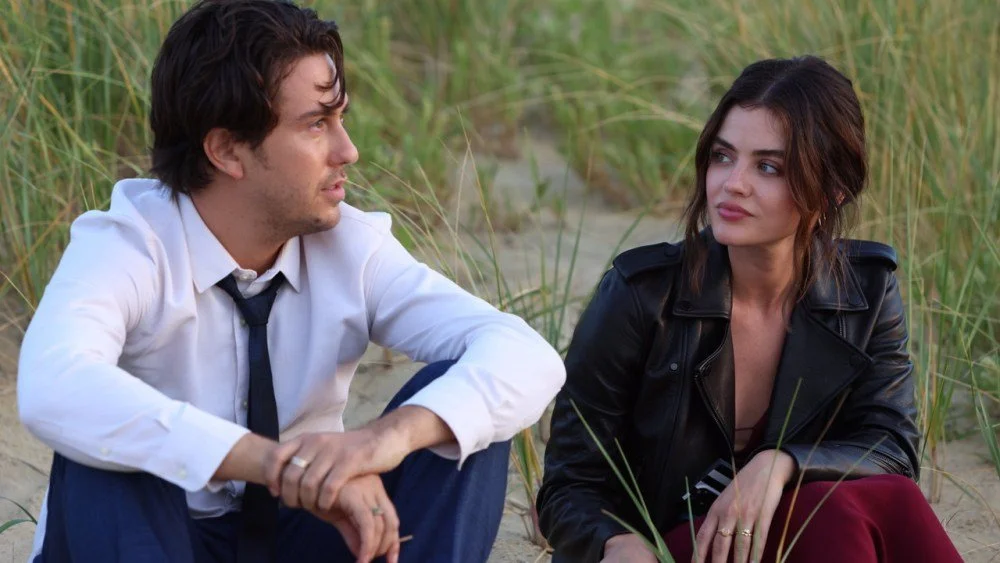WHICH BRINGS ME TO YOU balances modern sensibilities with a classic approach to romance
Which Brings Me to You
Directed by Peter Hutchings
Written by Keith Bunin
Starring Lucy Hale and Nat Wolff
Unrated
Runtime: 1 hour, 38 minutes
Now playing in theaters
By Megan Robinson, Staff Writer
A question that’s been asked time and again by ourselves and the art that we make is whether we can be more than our past mistakes. Regret runs deep within the veins of humankind, and we don’t know how to talk about it. Is there a right way to tell someone you made mistakes, or do you just hope you won’t make them again with a new person? Which Brings Me to You aims to explore this well-trodden ground as its two leads, complete strangers to each other, open up about the most embarrassing and traumatic loves they’ve lost in their lives. While the film is consistently engaging, its approach is inconsistent in quality and anchored by leads who are given little to work with to explore their acting chops despite the anthology-like rundown of their lives.
Jane (Lucy Hale) and Will (Nat Wolff) spot each other at a wedding. The tale is as old as time: she knows the bride, he knows the groom, and the two have an immediate sexual chemistry they fail to alleviate in a coat closet as Will backs out of the encounter. Jane, too tipsy to ditch the whole reception, goes on a walk to forget her embarrassment, but Will refuses to let up. From then on, the two take turns revealing their souls to each other, reminiscing on their first heartbreaks, their college breakups, and the mistakes they made again and again.
One might be led astray into believing Which Brings Me to You is a romantic comedy, but the film is played straight in more ways than one. Wolff and Hale don’t find so much humor in the material, which works for the most part but leads other scenes to feel a bit stiff. In a diner, Will offers up his piece of pie to Jane, until he decides he won’t give it to her until she exchanges an embarrassing story with him. Their back and forth doesn’t find the dry, sarcastic humor in the situation, instead just leaving things dry. In fact, though the film sells the idea of their romance based on unabashed truth, the execution leaves them in scenes with other, past romantic partners most of the time rather than with each other.
The film’s writing also struggles in making every character feel fully realized. We never stray from Will and Jane, but some of their past partners have more life breathed into them than others. Elton (Alexander Hodge), for example, is fascinating for the ways in which he was unknowable to Jane, a fun-loving free spirit trapped in a world of paranoia inside his own mind. Despite far less screen time, he is a much more richly developed character than Will or Jane, revealing the ultimate pitfall of the film’s structure — the stories they tell can be more interesting than the film at hand. Each story is an engaging look at how Will and Jane’s singular perspectives observe their flaws and heartbreaks, and the film overall is well-paced and grounded. Without the same kick to the central romance, however, the heartfelt end isn’t as impactful as our leads’ tears want you to believe.
Aesthetically, director Peter Hutchings and cinematographer Karina Silva capture the quiet beauty of the setting. Each sunset-purple sky is calming and endearing, along with the sandy beaches they explore. A surprise singing scene towards the film’s end bathes Will and Jane in neon lights, capturing the light that they find each other to be in exploring the darkness of their lives. Just as well, composer Spencer David Hutchings provides a calming, smooth jazz score that comforts and warms up the audience to this budding romance. Despite their extremely modern predicaments and ideas, the film has a classic feel to it, along with the rockabilly needle drops, diners, and cars with fuzzy dice hanging from the rearview mirror.
Which Brings Me to You is a comforting watch that beams with the hope that growth and change is possible. Though its script is uneven and interested in the least interesting characters, it’s the thought that counts here. Will and Jane might not be the beacons of the romance genre revived, but they make the same mistakes as the rest of us. More than anything, Which Brings Me to You is an honest look at modern love that provides the comfort that no one is perfect, but beauty can still be found all around, and even in each other.

